
Mayabazar is a 1957 Indian epic Hindu mythological film directed by K. V. Reddy. It was produced by Nagi Reddi and Chakrapani under their banner, Vijaya Productions. The film was shot simultaneously in Telugu and Tamil, with a few differences in the cast. The story is an adaptation of the folk tale Sasirekha Parinayam, which is based on the characters of the epic Mahabharata. It revolves around the roles of Krishna and Ghatotkacha, as they try to reunite Arjuna's son Abhimanyu with his love, Balarama's daughter Sasirekha (Savitri). The Telugu version features Gummadi, Mukkamala, Ramana Reddy, and Relangi in supporting roles, with D. Balasubramaniam, R. Balasubramaniam, V. M. Ezhumalai, and K. A. Thangavelu playing those parts in the Tamil version.

Missamma is a 1955 Indian Telugu-language romantic comedy film directed by L. V. Prasad. It was produced by Nagi Reddi and Chakrapani on Vijaya Productions banner. The film stars N. T. Rama Rao, Savitri, Akkineni Nageswara Rao and Jamuna. The script was adapted by Chakrapani from Rabindranath Maitra's Bengali play Manmoyee Girls' School. It revolves around two unemployed people — M. T. Rao and Mary — who pose as a married couple to obtain employment in a high school founded by Gopalam, a zamindar. As Rao and Mary fall in love, Gopalam's nephew A. K. Raju learns that Mary is Gopalam's missing elder daughter Mahalakshmi; she is unaware of her true identity.
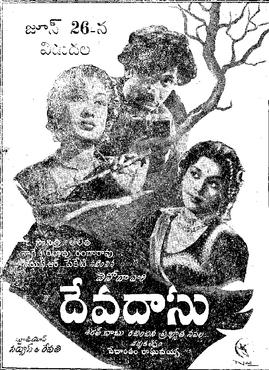
Devadasu is a 1953 Indian romantic drama film directed by Vedantam Raghavayya and produced by D. L. Narayana for Vinodha Pictures. Chakrapani wrote the script based on Sarat Chandra Chattopadhyay's novel, Devdas. C. R. Subbaraman composed the film's music. The film was edited by P. V. Narayanan, while B. S. Ranga provided the cinematography.
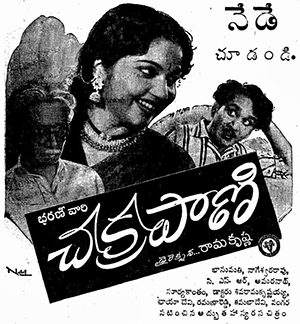
Chakrapani is a 1954 Indian Telugu-language comedy film, produced and directed by P. S. Ramakrishna Rao under the Bharani Pictures banner. It stars Bhanumathi and Akkineni Nageswara Rao with music composed and songs sung by Bhanumathi.
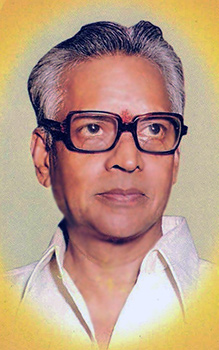
Saluri Rajeswara Rao was an Indian composer, multi instrumentalist, conductor, singer, and music producer known for his works predominantly in South Indian cinema. Regarded as one of the finest music composers, Rajeswara Rao's works are noted for integrating Indian classical music in Telugu cinema for over half a century.
Kadiri Venkata Reddy, commonly known as K. V. Reddy, was an Indian film director, screenwriter, and producer, primarily known for his work in Telugu cinema. Renowned as one of the most influential filmmakers in South Indian cinema, he directed 14 feature films during his career. His contributions earned him several prestigious accolades, including three National Film Awards and a Filmfare Award South.
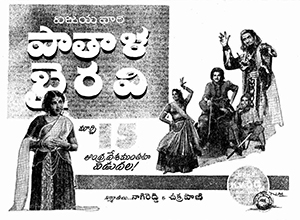
Pathala Bhairavi is a 1951 Indian fantasy film directed by K. V. Reddy who co-wrote the film with Pingali and Kamalakara Kameswara Rao. Shot simultaneously in Telugu and Tamil languages, the film was produced by Nagi Reddi and Chakrapani under the banner Vijaya Productions. It stars N. T. Rama Rao, S. V. Ranga Rao and K. Malathi. The film focuses on a gardener's son who has to amass wealth equal to that of the king of Ujjain to marry his daughter and a sorcerer who has to sacrifice an intelligent and brave young man to Goddess Pathala Bhairavi to gain access to a statuette which can grant any wish.
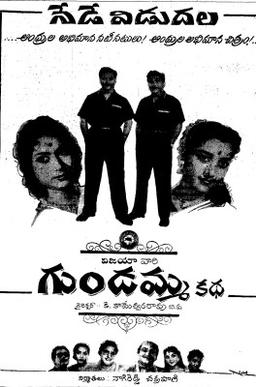
Gundamma Katha is a 1962 Indian Telugu-language comedy drama film directed by Kamalakara Kameswara Rao and co-produced by Nagi Reddi and Chakrapani under their banner Vijaya Productions. It stars N. T. Rama Rao, Akkineni Nageswara Rao, Savitri, and Jamuna, with S. V. Ranga Rao, Suryakantham, and Ramana Reddy in supporting roles.

Tenali Ramakrishna is a 1956 Indian Telugu-language political drama film produced and directed by B. S. Ranga based on Ch. Venkataramaiah's stage play of the same name. Produced for the banner Vikram Productions, it stars Akkineni Nageswara Rao, N. T. Rama Rao, V. Nagayya, Bhanumathi Ramakrishna, and Jamuna in key roles. Ranga handled the cinematography with his brother-in-law B. N. Haridas while P. G. Mohan edited the film. Viswanathan–Ramamoorthy composed the soundtrack and background score.
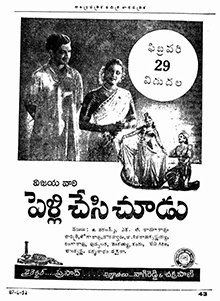
Pelli Chesi Choodu is a 1952 Indian satirical comedy film directed by L. V. Prasad and produced by Nagi Reddi and Chakrapani under their company Vijaya Productions. The film was made simultaneously in Telugu and Tamil, the latter titled Kalyanam Panni Paar. It stars N. T. Rama Rao, G. Varalakshmi, Yandamuri Joga Rao and Savitri. S. V. Ranga Rao, Sivarama Krishnayya, Doraswamy, and Suryakantham play supporting roles in the Telugu version while C. V. V. Panthulu replaced Krishnayya in Tamil.

Appu Chesi Pappu Koodu is a 1959 Indian Telugu-language comedy drama film directed and co-written by L. V. Prasad. The film was produced by Nagi Reddi and Chakrapani of Vijaya Productions; the latter co-wrote its script with Prasad and Vempati Sadasivabrahmam. It is the Telugu version of Prasad's Tamil film Kadan Vaangi Kalyaanam (1958). Starring N. T. Rama Rao, Relangi and Savitri, Appu Chesi Pappu Koodu features Jaggayya, C. S. R. Anjaneyulu, S. V. Ranga Rao, and Jamuna in supporting roles. The conflict between two older men with different mindsets—Ramadasu and Mukundarao —is the film's centrepiece.
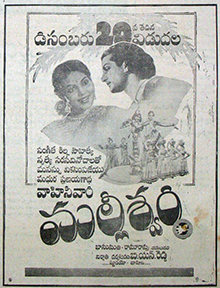
Malliswari is a 1951 Indian Telugu-language historical romance film produced and directed by B. N. Reddi under his banner Vauhini Studios. P. Bhanumathi and N. T. Rama Rao star as a couple – Nagaraju and Malliswari – who are separated by Malliswari's greedy mother. Malliswari is sent to the king's palace according to the custom of "Rani Vasam", a tradition during the Vijayanagara Empire wherein young women were fetched to the palace with an offering of gold and jewellery to their parents. The rest of the film focuses on the consequences faced by Nagaraju when he, against all rules, surreptitiously enters the palace to meet Malliswari.

Dharma Patni or Dharmapatni is a 1941 Indian Telugu-language drama film produced and directed by P. Pullayya under the Famous Films banner. It stars Santha Kumari, Bhanumathi, Uppuluri Hanumantha Rao and C. Hemalatha. The film marks the debut of Akkineni Nageswara Rao, who played a minor role as one of the ten school children in a song sequence, and also that of the writer Chakrapani.

Pennin Perumai is a 1956 Indian Tamil-language film starring Sivaji Ganesan, Gemini Ganesan, Savitri and Santha Kumari. It is a remake of the Telugu film Ardhangi, which was based on Maddipatla Suri's Telugu translation of the Bengali novel Swayamsiddha, written by Manilal Banerjee. The film was released on 17 February 1956.

Pooja Phalam is a 1964 Indian Telugu-language drama film directed and co-written by B. N. Reddy. It stars Akkineni Nageswara Rao, Savitri and Jamuna, with music composed by S. Rajeswara Rao. The film is based on the novel Poojari, written by Munipalle Raju.
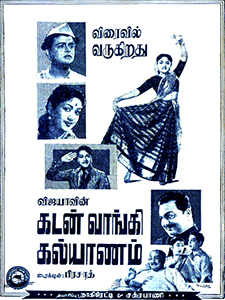
Kadan Vaangi Kalyaanam is a 1958 Indian Tamil-language satirical comedy film directed by L. V. Prasad. The film stars R. Ganesh, Savithri and Jamuna. It was simultaneously shot in Telugu as Appu Chesi Pappu Koodu, which was released the following year.
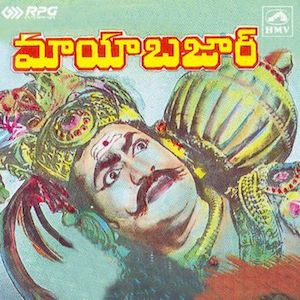
Mayabazar: Music from the Motion Picture is the soundtrack album of the 1957 Indian bilingual film of the same name which was simultaneously shot in Telugu and Tamil. Ghantasala composed most of the album and the background score for the film. The soundtrack album features 12 tracks, whose lyrics were penned by Pingali Nagendrarao and Thanjai N. Ramaiah Dass for the Telugu and Tamil versions respectively.
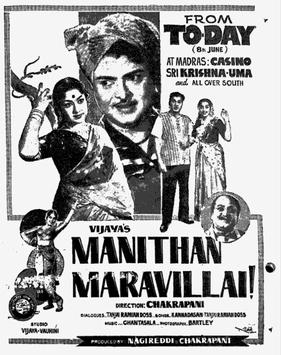
Manithan Maravillai is a 1962 Indian Tamil-language comedy drama film written, co-produced and directed by Chakrapani and produced by Nagi Reddi under Vijaya Productions. It is a remake of the Telugu film Gundamma Katha, which itself is based on the 1958 Kannada film Mane Thumbida Hennu.

Missiamma is a 1955 Indian Tamil-language romantic comedy film directed by L. V. Prasad. Produced by B. Nagi Reddy and Aluri Chakrapani's Vijaya Vauhini Studios, the script was adapted by Chakrapani from the Bengali novel Manmoyee Girls School by Rabindranath Maitra. Missiamma also focused on social issues such as unemployment, corruption, and freedom of worship. Missiamma tells the story of two unemployed people of different religions and mentalities: Balu and Mary. They pose as a married couple to obtain jobs in a high school founded by Gopal, the zamindar of Aandipettai. As Balu and Mary fall in love, Gopal's nephew Raju learns that Mary is Gopal's missing elder daughter Mahalakshmi; she is unaware of her true identity.

















